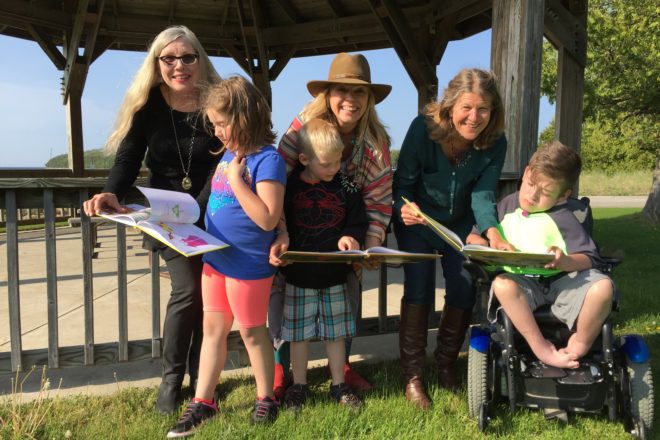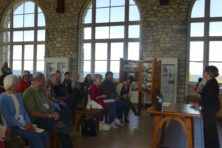Culture Club: Read A Book To Your Child
- Share
- Tweet
- Pin
- Share

by Maggie Rossiter Peterman
If parents carve out just 20 minutes a day to read to their children, it will help boost them into the driver’s seat on the road to success.
Reading exposes children to literature, imagination, storytelling, fluency, vocabulary development and different types of composition, say a trio of Door County educators.
“Reading to children is the single most important thing parents can do that leads to success later on,” says Diane Jenquin, a former middle school science teacher and now a reading specialist in the Sevastopol School District and a 26-year veteran educator.
“Just reading 15 to 20 minutes a day really improves reading skills no matter how old you are. If children can’t read, they can’t do anything else.”
To encourage reading when she was teaching middle school, Bridget Schopf read picture books daily to her seventh-grade students. Then she invited her students to bring their favorite books to class.
“They all did, along with the reasons why particular books were treasures,” said Schopf, an instructional coach and literacy specialist for Gibraltar School District.
Reading and writing is a sales job.
“If I just put a bunch of books on a shelf, no one would read them,” she says. “So I do book talks. It’s important to give background information on a topic. It helps any reader.”
Parents play a critical role in helping children learn to read, which leads to helping them become good writers, Schopf explains.
“We need to get parents to see the importance of reading at home,” she says. “We’re going to knock on doors and do home visits.”
Schopf also is going to bat to increase time for reading during the school day for middle and high school students. The demands on academics in the school day have decreased the amount of time available for students to explore personal reading. They miss it, Schopf points out.
“More kids are coming out of elementary school liking reading,” she says. “They have learned how to choose books that are a good fit for them. When I tell older students there’s not enough time to read (in class), they complain, ‘What, I can’t read my book?’”
It’s like practicing the piano, Schopf says.
“You just have to keep doing it,” she says. “That’s how you get better.”
Reading helps build a bond between parents and children. Children learn that reading is important by watching their parents read. They hear what fluent readers sound like. And reading expands their vocabulary. It also exposes children to how a book works: beginning, middle and end.
When high school students are absorbed in quiet reading time, Jenquin also pulls out a book.
“Modeling is important,” she says. “I may come to a paragraph and laugh. The kids say, ‘What’s happening? Can you read it to me?’”
Reading encourages communication between parents and children. Parents can engage their children with a few simple questions about pictures. It helps children develop listening and oral reading skills. Parents can ask their children for their opinions on why they like or dislike a book. Then mom or dad can share their preference.
Educators often talk about the reading-writing connection.
Reading makes better writers, says Vinni Chomeau, project coordinator for Friends of Gibraltar, which provides cultural experiences for students. She also is a board member for Write On, Door County, a young nonprofit that supports writers and readers of all ages and levels of development.
“Experiences are even more important for both readers and writers,” she says. “That’s what makes really good books so important to read. They can create experiences.”
She points to the Harry Potter books as an example.
“Kids know the whole new language of wizards they wouldn’t have otherwise,” she says.
During the eight years Jenquin taught middle school science, she discovered that many students could excel at hands-on experiments and activities but failed at gathering information, documenting data and taking tests.
“They couldn’t read the material,” she says.
So she returned to the classroom to become a reading specialist and certified literacy coach. She often learns from her students. When a student suggested Fahrenheit 451 – a Ray Bradbury novel published in 1953 about a future society where books were outlawed and burned – she admits she liked it and never would have picked it up.
Helping children find books that are of interest to them is important. Jenquin worked five months to find the right genre for one of her middle school students.
“It took us from September to February to find the right fit, but he’s finished 23 books since then,” she says. “He’s gone from reading easy books to books that are more difficult. He’s discovered he likes reading.”
Encouraging reading as a family activity is one of the goals of Write On, Door County’s open house. Executive Director Jerod Santek notes that reading is often seen as a solitary activity when, in fact, it is a way to bring families together and to learn more about each other. Authors of books with a Door County focus will be featured at the open house, scheduled from 1 – 4 pm on Sunday, June 12.
“When kids have the opportunity to meet an author, the world of books and reading changes for them dramatically,” Santek says. “They appreciate books in an entirely new way.”
Maggie Peterman is a retired journalist from Saginaw, Michigan, who volunteers on Write On, Door County’s marketing committee.
Peninsula Arts and Humanities Alliance, Inc., which contributes Culture Club throughout the summer season, is a coalition of nonprofit organizations whose purpose is to enhance, promote and advocate the arts, humanities and natural sciences in Door County.

